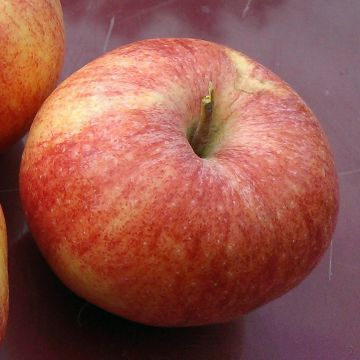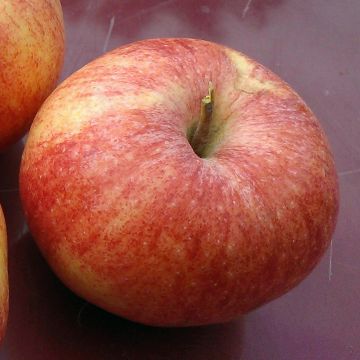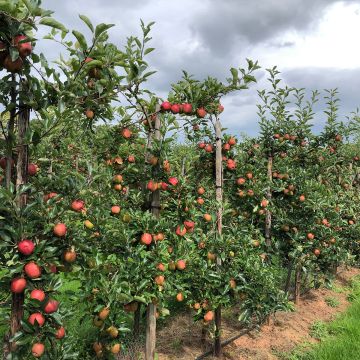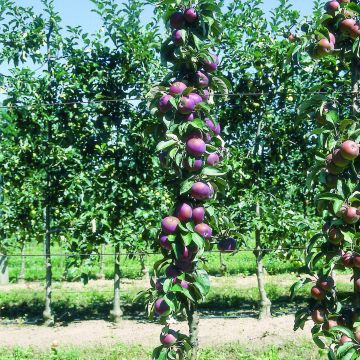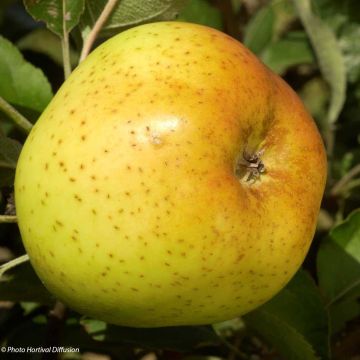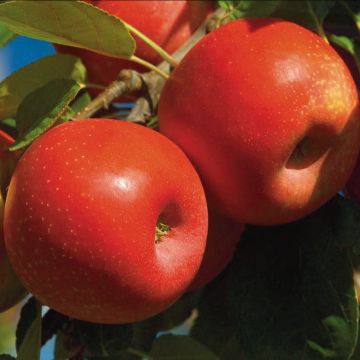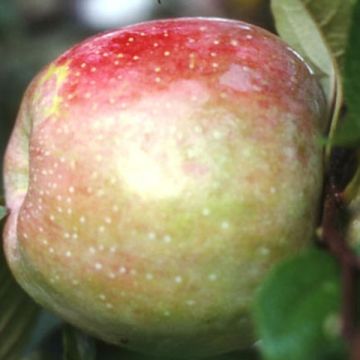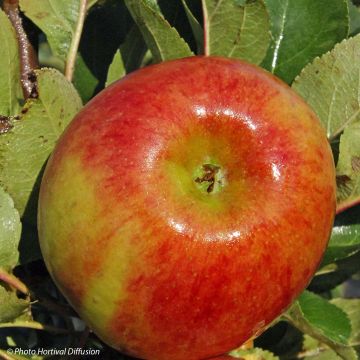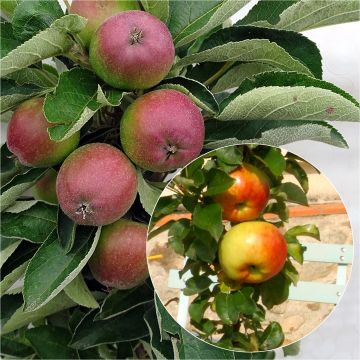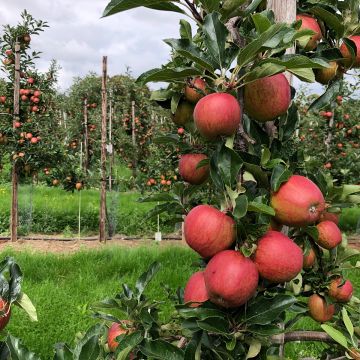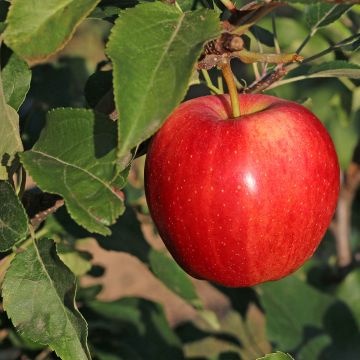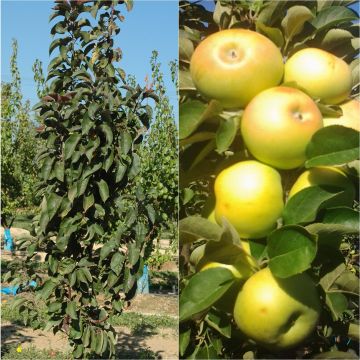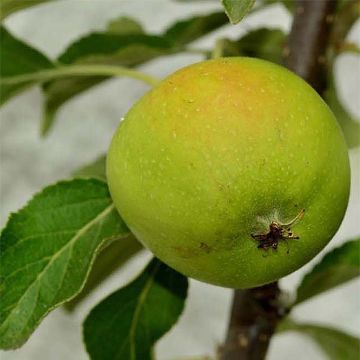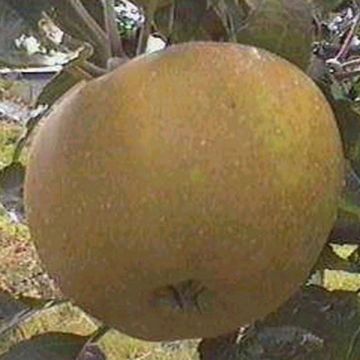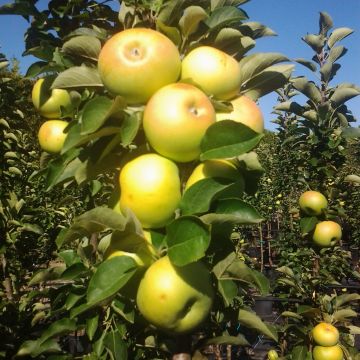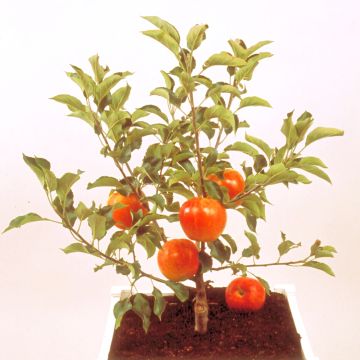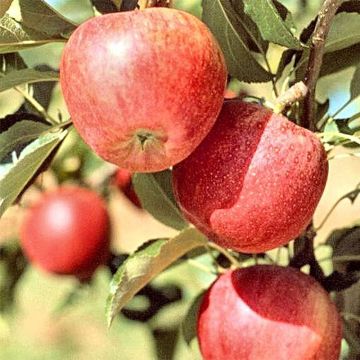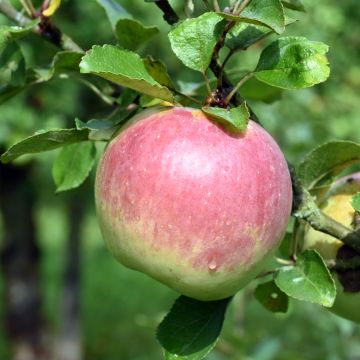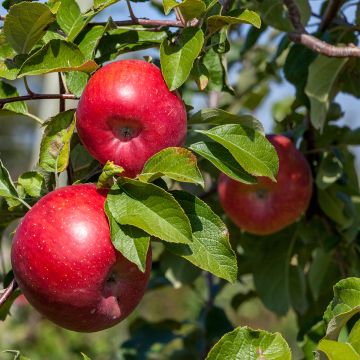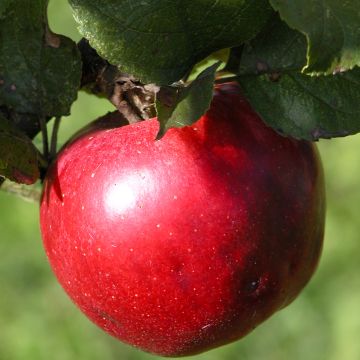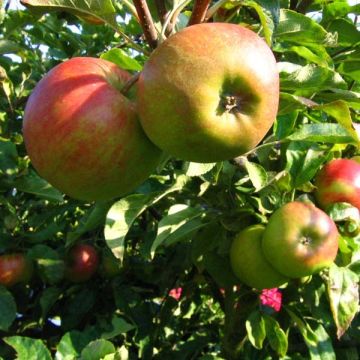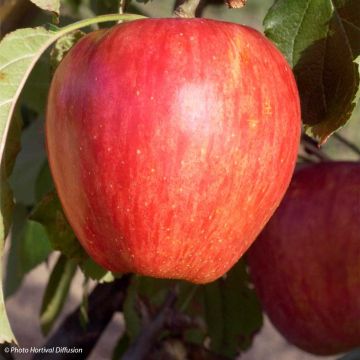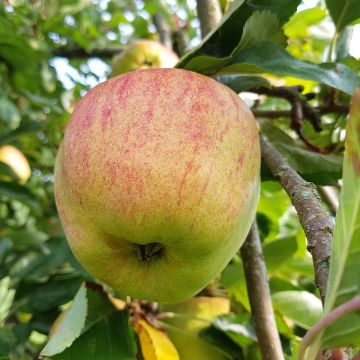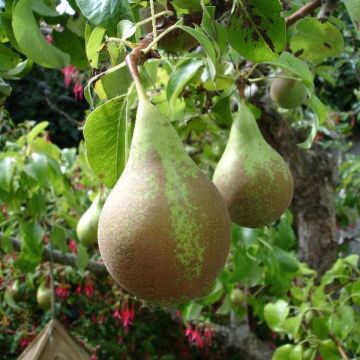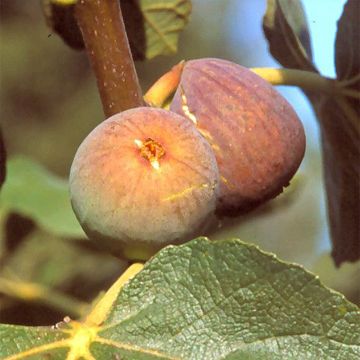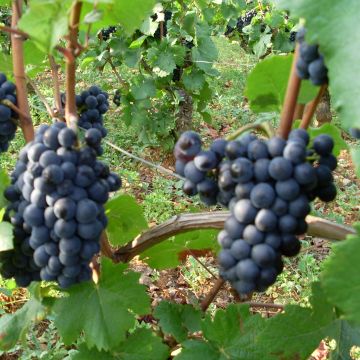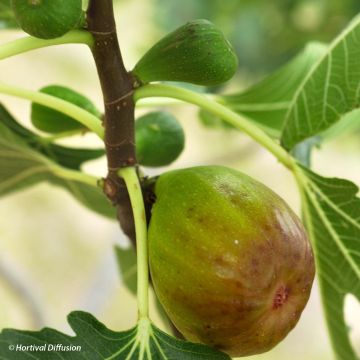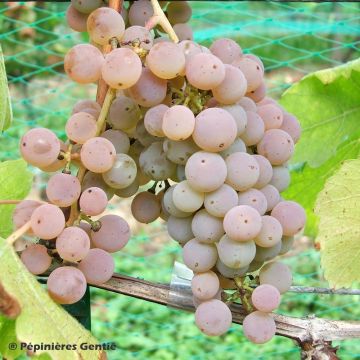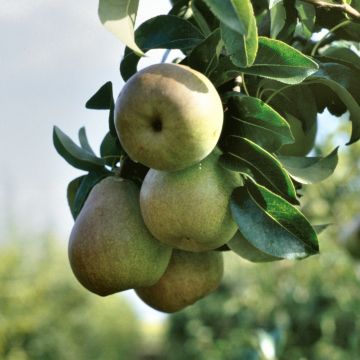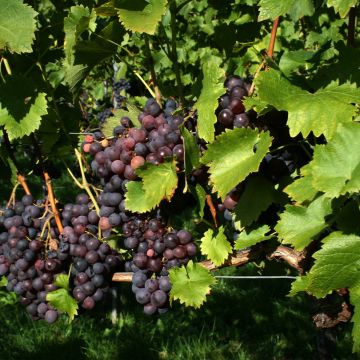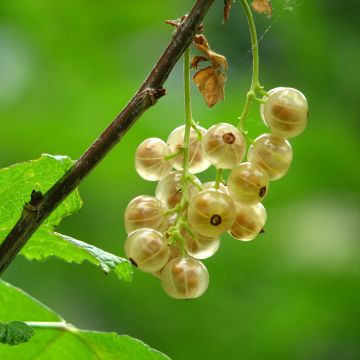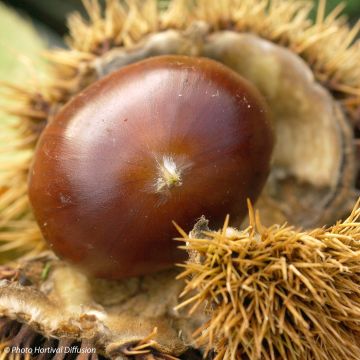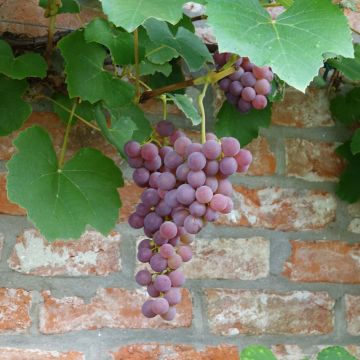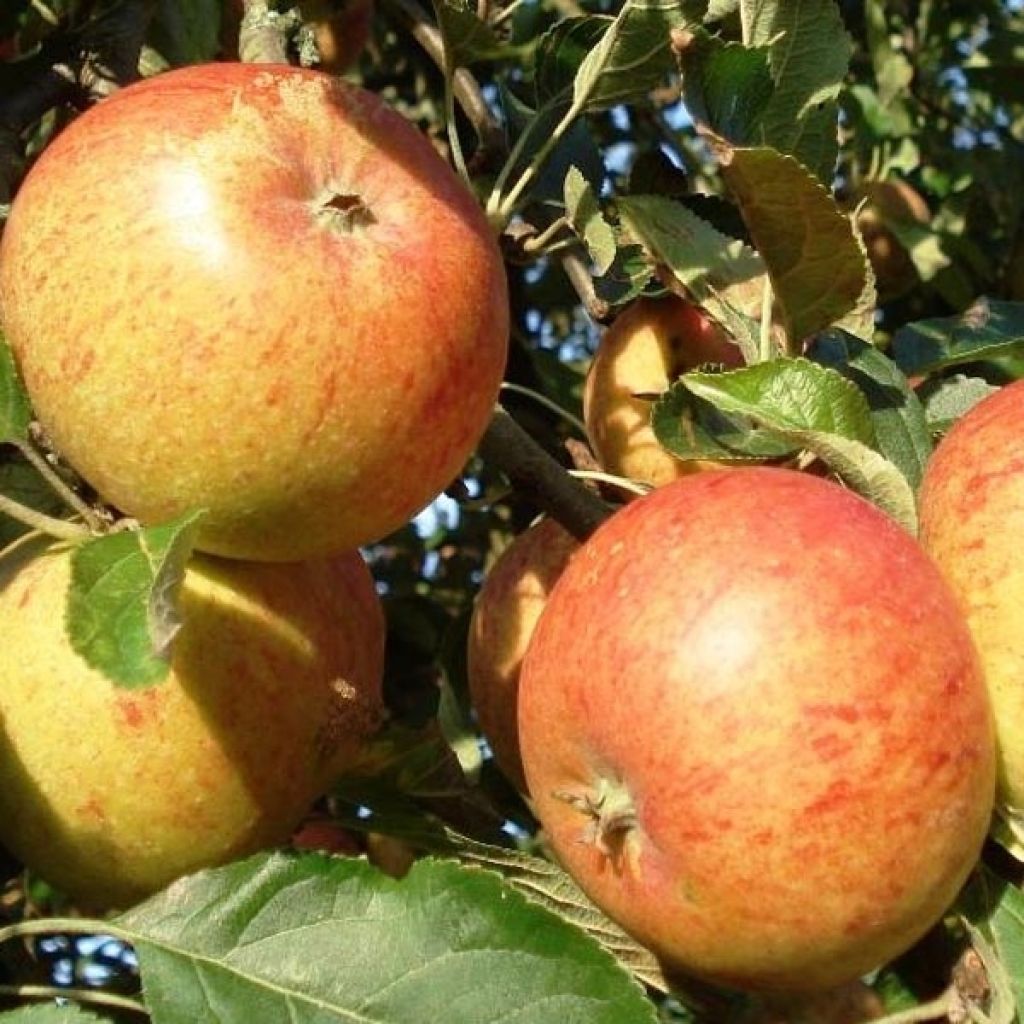

Pommier Cox Orange Pippin Bio en racines nues, forme scion
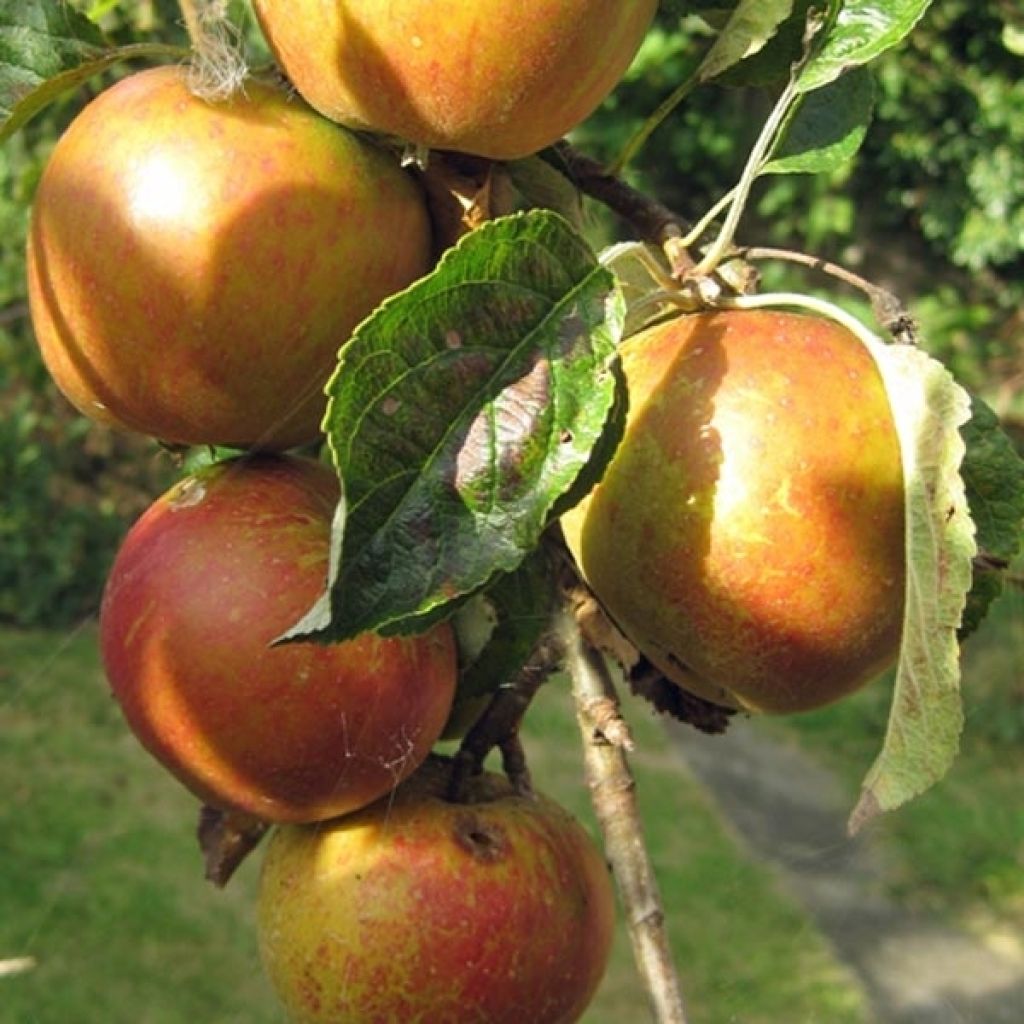

Pommier Cox Orange Pippin Bio en racines nues, forme scion
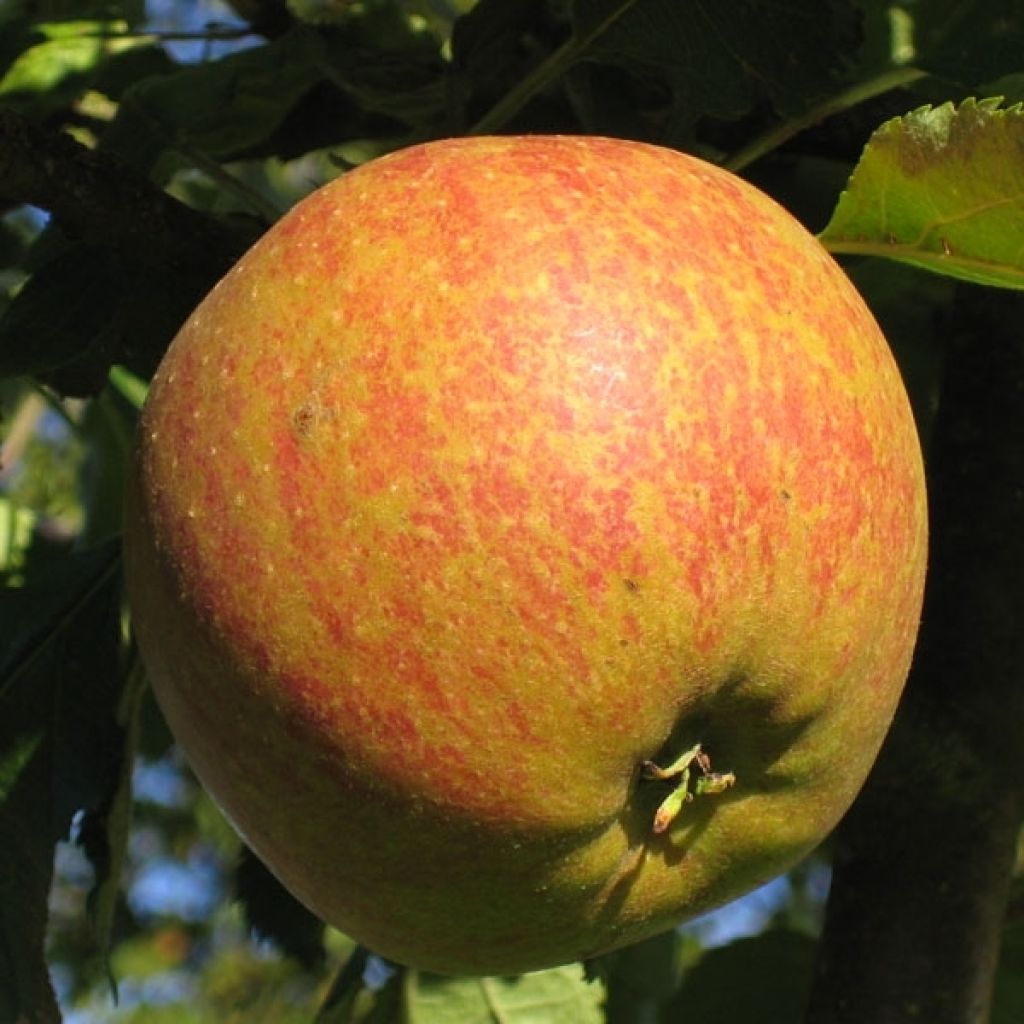

Pommier Cox Orange Pippin Bio en racines nues, forme scion
Organic Apple Tree Cox's Orange Pippin - Malus domestica
Malus domestica Cox Orange
Apple, Orchard apple, Table apple, Cultivated apple
Le scion semble vigoureux, les racines bien développées. Un bémol pour la livraison : la date prévue n'a pas été respectée, du coup la plante est restée une semaine dans le carton à racines nues. J'ai appelé Promesse de fleurs qui a noté ma remarque, on m'a garanti la reprise, sinon le pied sera remplacé. J'attends de voir.
Bernadette, 22/01/2023
Why not try an alternative variety in stock?
View all →This plant carries a 6 months recovery warranty
More information
We guarantee the quality of our plants for a full growing cycle, and will replace at our expense any plant that fails to recover under normal climatic and planting conditions.
Oversize package: home delivery by special carrier from €6.90 per order..
Express home delivery from €8.90.
Description
The Organic 'Cox's Orange Pippin' Apple is an ancient variety highly prized for the flavour of its reinette apples, and particularly suitable for the Breton and Norman climates or similar coll and humid regions. The tree has medium vigour, good productivity, and is capable of producing some fruit as early as its third or fourth year. However, it tends to alternate and is rather susceptible to diseases such as scab and powdery mildew. The fruits are medium-sized, flat-shaped, and yellow-orange with red stripes. Their creamy yellow flesh is crunchy, fine, juicy, aromatic, sweet, and slightly acidic. They reach ripeness from September, but the harvest will be in October. The fruits can be stored until December-January. The 'Cox's Orange Pippin' Apple is not self-fertile.
Plant from Organic Agriculture.
The apple tree is native to Europe, especially in France where its presence has been documented since antiquity. The 'Cox's Orange Pippin' Apple is a variety resulting from a seedling of Ribston Pippin, obtained by Mr. Cox in England in 1825.
The 'Cox's Orange Pippin' Apple is an upright tree, giving a very elegant and slender appearance. It reaches about 3.50m (11ft) in all directions at maturity. In case of high productivity, thinning is necessary to avoid small fruit size and the occurrence of diseases.
Its foliage consists of very large, ovate, slightly hairy, dark green leaves on top and whitish-green underneath, deeply toothed.
The delightful white-pink flowering occurs from April 15th, and is usually spared by frost in its growing area. Since 'Cox's Orange Pippin' is self-sterile, the presence of apple trees with flowering occurring at the same time is necessary. The varieties 'Calville Blanche d'Hiver', 'Jonathan', and 'Reine des Reinettes' are the most suitable.
Fruit set begins in September. The fruits will be consumed from October to January. They can be stored very well in a cool place. The medium-sized fruits are yellow-orange with red stripes, flattened. Their creamy yellow flesh is crunchy, fine, juicy, aromatic, sweet, and slightly acidic.
These apples are particularly good for eating fresh. They can also be used in pastries, jams, jellies, or in savoury dishes, in combination with Norman cheeses, for example.
For transportation reasons, our tallest scions may be pruned before shipping. They are suitable for all common training sizes: cordons, espaliers, goblets, half-standards, and low standards, except for high standards. If you would like more information or advice on training your fruit trees, please do not hesitate to contact us.
Report an error about the product description
Organic Apple Tree Cox's Orange Pippin - Malus domestica in pictures
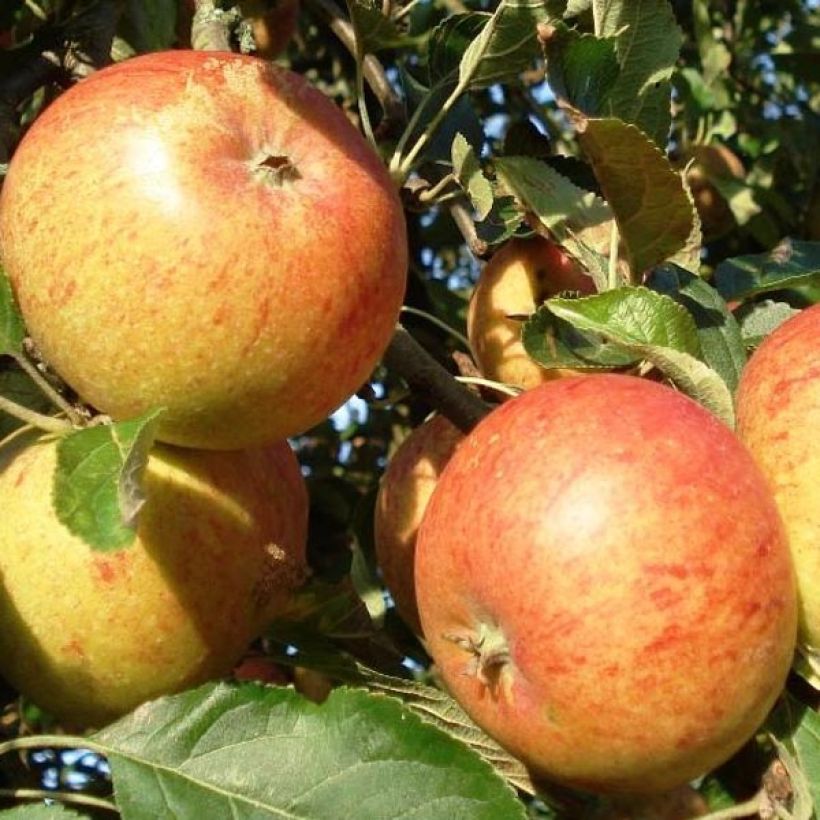

Plant habit
Fruit
Flowering
Foliage
Botanical data
Malus
domestica
Cox Orange
Rosaceae
Apple, Orchard apple, Table apple, Cultivated apple
Cultivar or hybrid
Other Apple trees
Planting and care
Choose a sunny location for your 'Cox's Orange Pippin' Apple Tree, the soil can be slightly chalky or acidic but without excess. Dig a wide planting hole at least 3 times the volume of the root ball. Simultaneously add organic matter (topsoil, compost...) and a basal fertilizer like crushed bark. Do not bury the graft collar. Stake if necessary. Water abundantly, even in winter, even if it rains. Fruit trees are ideally planted between October and March, outside of the freezing period. Container-grown plants can be planted all year round except during periods of extreme heat or frost.
You can add a small handful of wood ash, rich in potash, during winter, this will improve fruiting. Monitor for potential aphid attacks during the season. A white felt-like covering due to a fungus, powdery mildew, may appear on the leaves in summer, but it does not harm fruit development in gardens. Harvest takes place in September. Only keep harvested fruits. Apples should be stored with the stem downwards, on racks or in crates. Choose a preferably completely dark, dry, cool location, but frost-free.
Planting period
Intended location
Care
-
, onOrder confirmed
Reply from on Promesse de fleurs
Ancient and local varieties
Haven't found what you were looking for?
Hardiness is the lowest winter temperature a plant can endure without suffering serious damage or even dying. However, hardiness is affected by location (a sheltered area, such as a patio), protection (winter cover) and soil type (hardiness is improved by well-drained soil).

Photo Sharing Terms & Conditions
In order to encourage gardeners to interact and share their experiences, Promesse de fleurs offers various media enabling content to be uploaded onto its Site - in particular via the ‘Photo sharing’ module.
The User agrees to refrain from:
- Posting any content that is illegal, prejudicial, insulting, racist, inciteful to hatred, revisionist, contrary to public decency, that infringes on privacy or on the privacy rights of third parties, in particular the publicity rights of persons and goods, intellectual property rights, or the right to privacy.
- Submitting content on behalf of a third party;
- Impersonate the identity of a third party and/or publish any personal information about a third party;
In general, the User undertakes to refrain from any unethical behaviour.
All Content (in particular text, comments, files, images, photos, videos, creative works, etc.), which may be subject to property or intellectual property rights, image or other private rights, shall remain the property of the User, subject to the limited rights granted by the terms of the licence granted by Promesse de fleurs as stated below. Users are at liberty to publish or not to publish such Content on the Site, notably via the ‘Photo Sharing’ facility, and accept that this Content shall be made public and freely accessible, notably on the Internet.
Users further acknowledge, undertake to have ,and guarantee that they hold all necessary rights and permissions to publish such material on the Site, in particular with regard to the legislation in force pertaining to any privacy, property, intellectual property, image, or contractual rights, or rights of any other nature. By publishing such Content on the Site, Users acknowledge accepting full liability as publishers of the Content within the meaning of the law, and grant Promesse de fleurs, free of charge, an inclusive, worldwide licence for the said Content for the entire duration of its publication, including all reproduction, representation, up/downloading, displaying, performing, transmission, and storage rights.
Users also grant permission for their name to be linked to the Content and accept that this link may not always be made available.
By engaging in posting material, Users consent to their Content becoming automatically accessible on the Internet, in particular on other sites and/or blogs and/or web pages of the Promesse de fleurs site, including in particular social pages and the Promesse de fleurs catalogue.
Users may secure the removal of entrusted content free of charge by issuing a simple request via our contact form.
The flowering period indicated on our website applies to countries and regions located in USDA zone 8 (France, the United Kingdom, Ireland, the Netherlands, etc.)
It will vary according to where you live:
- In zones 9 to 10 (Italy, Spain, Greece, etc.), flowering will occur about 2 to 4 weeks earlier.
- In zones 6 to 7 (Germany, Poland, Slovenia, and lower mountainous regions), flowering will be delayed by 2 to 3 weeks.
- In zone 5 (Central Europe, Scandinavia), blooming will be delayed by 3 to 5 weeks.
In temperate climates, pruning of spring-flowering shrubs (forsythia, spireas, etc.) should be done just after flowering.
Pruning of summer-flowering shrubs (Indian Lilac, Perovskia, etc.) can be done in winter or spring.
In cold regions as well as with frost-sensitive plants, avoid pruning too early when severe frosts may still occur.
The planting period indicated on our website applies to countries and regions located in USDA zone 8 (France, United Kingdom, Ireland, Netherlands).
It will vary according to where you live:
- In Mediterranean zones (Marseille, Madrid, Milan, etc.), autumn and winter are the best planting periods.
- In continental zones (Strasbourg, Munich, Vienna, etc.), delay planting by 2 to 3 weeks in spring and bring it forward by 2 to 4 weeks in autumn.
- In mountainous regions (the Alps, Pyrenees, Carpathians, etc.), it is best to plant in late spring (May-June) or late summer (August-September).
The harvesting period indicated on our website applies to countries and regions in USDA zone 8 (France, England, Ireland, the Netherlands).
In colder areas (Scandinavia, Poland, Austria...) fruit and vegetable harvests are likely to be delayed by 3-4 weeks.
In warmer areas (Italy, Spain, Greece, etc.), harvesting will probably take place earlier, depending on weather conditions.
The sowing periods indicated on our website apply to countries and regions within USDA Zone 8 (France, UK, Ireland, Netherlands).
In colder areas (Scandinavia, Poland, Austria...), delay any outdoor sowing by 3-4 weeks, or sow under glass.
In warmer climes (Italy, Spain, Greece, etc.), bring outdoor sowing forward by a few weeks.

































